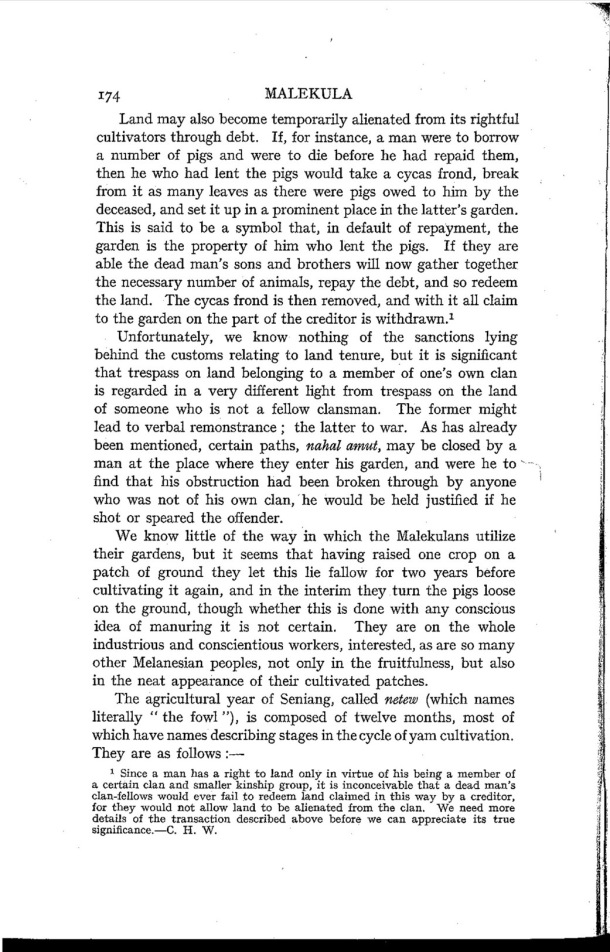|
|  [Note: this transcription was produced by an automatic OCR engine]
r74 MALEKULA
Land may also become temporarily alienated from its rightful
cultivators through debt. If, for instance, a man were to borrow
a number of pigs and were to die before he had repaid them,
then he who had lent the pigs would take a cycas frond, break
from it as many leaves as there were pigs owed to him by the
deceased, and set it up in a prominent place in the latter’s garden.
This is said to be a symbol that, in default of repayment, the
garden is the property of him who lent the pigs. If they are
able the dead man's sons and brothers will now gather together
the necessary number of animals, repay the debt, and so redeem
the land. The cycas frond is then removed, and with it all claim
to the garden on the part of the creditor is withdrawn.‘
Unfortunately, we know nothing of the sanctions lying
behind the customs relating to land tenure, but it is signiï¬Åcant
that trespass on land belonging to a member of one’s own clan
is regarded in a very different light from trespass on the land
of someone who is not a fellow clansman. The former might
lead to verbal remonstrance ; the latter to war. As has already
been mentioned, certain paths, nahal amui, may be closed by a
man at the place where they enter his garden, and were he to
ï¬Ånd that his obstruction had been broken through by anyone
who was not of his own clan, he would be held justified if he
shot or speared the offender.
We know little of the way in which the Malekulans utilize
their gardens, but it seems that having raised one crop on a
patch of ground they let this lie fallow for two years before
cultivating it again, and in the interim they turn the pigs loose
on the ground, though whether this is done with any conscious
idea of manuring it is not certain. They are on the whole
industrious and conscientious workers, interested, as are so many
other Melanesian peoples, not only in the fruitfulness, but also
in the neat appearance of their cultivated patches.
The agricultural year of Seniang, called netew (which names
literally “the fowl â€ù), is COMPOSED of twelve mouths, most of
which have names describing stages in the cycle of yam cultivation.
They are as follows :——
1 Since s man has a right to land only in virtue of his being a member of
a certain clan and smaller kinship group, it is inconceivable that a dead man’s
clan-iellows would ever fail to redeem land claimed in this way by B creditor,
for they would not allow land to be alienated irorn the clan. We need more
details of the transaction described above before we can appreciate its true
signifcance.—C. H. W.
‘*1
»
1
it
4
ii
ii
4.
_,.....-asst. < ;_. _,
,.
|